| |
"Despite a commercially respectable career both within the studio system and as an independent producer-director, Robert Aldrich remains an ill-appreciated, if not entirely bothersome presence for most American critics. Andrew Sarris did praise Aldrich in 1968 as "one of the most strikingly personal directors of the past two decades"; yet, for the most part, it has remained to the French and the English to attempt to unravel the defiant quirkiness of Aldrich's career." |
| |
Ed Lowry, filmreference.com * |
From my limited and inevitably prejudiced cinematic point of view, Robert Aldrich is a name that conjures up memories of solidly wrought adult dramas and the odd comedy. His is neither an above-the-title director's name but nor is it an ignored journeyman's. The filmmaker has good form and a very personal directorial voice. In his seminal tome The American Cinema, critic Andrew Sarris sets Aldrich in the category he calls 'The Far Side of Paradise', directors who would be in the pantheon of their craft if not dogged by a "fragmentation of their personal vision" or "disruptive career problems". It's true that Aldrich never managed to maintain height in a career with its fair share of wonderful movies but there were also a number of so-so films that the director wasn't shy about condemning. Aldrich's career encompasses a lot of great work but he never made it into the 'auteur' club however much European critics tried to crowbar him into it. If the famously macho Ernest Hemmingway had a brother who directed movies, Aldrich was his man. Unfailingly manly (if we can still use that word without irony) Aldrich's movies often presented overtly masculine subjects and treated them with great gusto and humour. For their time, his war pictures skirted with barely acceptable screen violence. His biggest hit coming on the heels of one of his biggest disappointments, The Dirty Dozen, was a violent sensation on release and now probably plays uncut on Sunday afternoons.
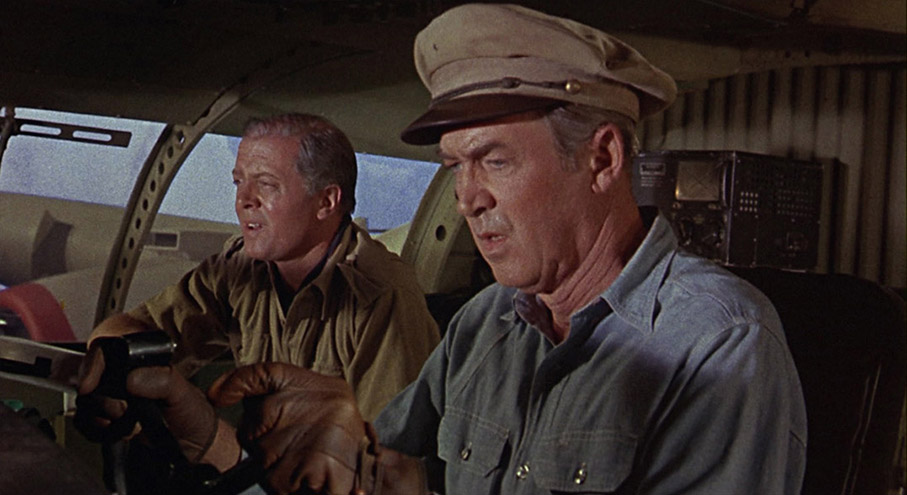
Ignored and a failure on its release, Aldrich's The Flight of the Phoenix has since enjoyed a re-evaluation and now sits proudly in the 'classic' seat of the disaster genre. There is a great deal to be enjoyed but I'm getting ahead of myself. What's the scoop? A twin prop passenger plane takes off over the Libyan Desert ferrying its travellers to Benghazi. Among the group is a pair of British soldiers, various oil workers, an aeronautical engineer, and a doctor. Encountering a sandstorm, the pilot, Frank Towns, has to crash land. Once down, and after sustaining a few fatalities, the men realise they are so far off course that a rescue attempt is unlikely. The soldier, Captain Harris, suggests walking through the desert to get help. Not an expert in deserts then. After figuring out when the water will run out, the German engineer Dorfmann suggests rebuilding another plane from the wreckage, hence the name 'Phoenix'. So it's both a race against time and a pressure cooker drama with men at the limits of their survival capabilities and it's a corker primarily due to a smart script by Lukas Heller based on Elleston Trevor's novel and a superb cast who imbue even the smallest of roles with real bite. There's not a dud scene in the whole of its relatively lengthy running time (that's not to say there aren't a few oddities but more on those later) and the suspense at times is up there with the best Hitchcockian moments. Where Aldrich excels in particular is infusing small moments with character significance. Helped considerably by his editor, Michael Luciano, Aldrich peppers the movie with minor but cherishable moments, moments that ask the audience members to think for themselves. Both early victims of the crash are identified after death by their possessions, the broken neck of a lute and a Playboy magazine. The economy is laudable. There's the look on the pilot's face as one of the men is caught in a lie, just small gestures but Aldrich catches them expertly.
A movie like this stands or falls on the shoulders of its cast and Phoenix has a dream team. Jimmy Stewart plays Towns, the old school pilot. Around this time in his career, Stewart was trading on a beguiling ambiguity. His characters were always reliably decent but he had enough steel and vulnerability to play a far greater range than he was usually expected to play. Aldrich makes him the emblem of the old stick and rudder man, a figure of the past well aware that the future is fast catching up with him. Having a whale of a time playing his alcoholic navigator, Moran, is Richard Attenborough. Given his extraordinary achievements in the director's chair, it's easy to overlook what a fine actor he was. Hardy Krüger as Dorfmann is the face of the future, one of the men whom Stewart identifies as... "The little men with the slide rules and computers..." who "...are going to inherit the Earth..." Krüger is superb in the role deftly subverting the über-efficient German stereotype and yet also endorsing it. He's the steel spine of logic and reason in a situation that often prompts unproductive sentimentality. His ruthlessness is probably the main reason any of the men survived their ordeal... Or did they? No spoilers. He's also the innocent cause of the movie's later rug-pull, a facet of the film the trailer plays with calling it 'an ironic twist of fate'. It's not a conventional sting in the tail but it is enormously dramatic.
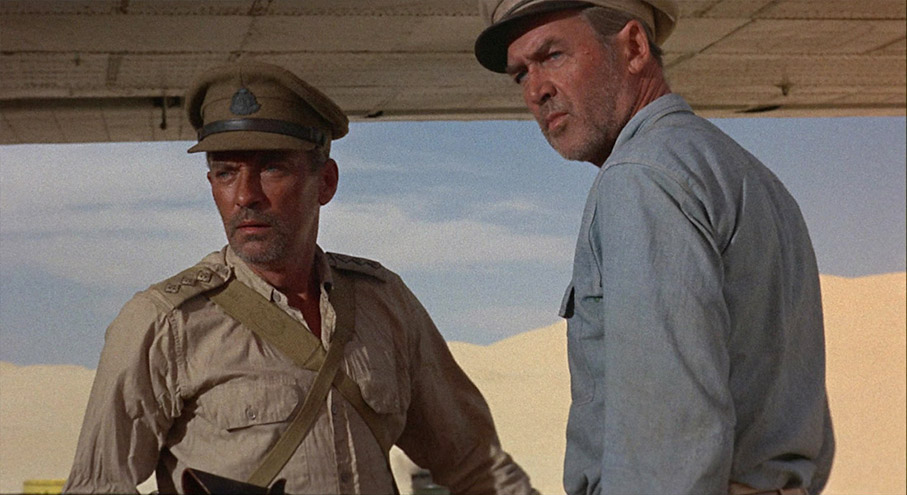
Skirting with stereotype again is Captain Harris played with spine-no-straighter by Peter Finch. So entrenched with the military ideal, he cannot read ordinary human signage (the fact that his subordinate Sgt. Watson is a hairsbreadth away from total rebellion) and is also convinced of his own invulnerability. It's a fine performance because at various stages in the film you feel so damn sorry for him and the fact he behaves so correctly when we know his sergeant is quite clearly faking injury to get out of hazardous missions. Ronald Fraser plays Sgt. Watson and what a gamut he displays. While some of his actions are understandable (not sure how long I'd last with Finch as my commanding officer), some others are irredeemably evil. The fact that he's treated with the same nature-like indifference the film shows towards all of the men's survival is a big and unusual plus. In fact, no spoilers but at times, cine-morality could be said to work in reverse in this movie. Ernest Borgnine is the truly pathetic figure, mentally challenged and desperately needing to amount to something, anything. Ian Bannen provides a lot of the humour as Ratbags, the Scottish realist who never passes up an opportunity to make fun of his fellow survivors. Despite his lackadaisical attitude towards his co-survivors, he works well under pressure and is one of the more rounded secondary characters. Bannen and the editor Luciano both got Oscar nods for their work on this film.
The strangest credit at the front of the movie – and there's a poignant one at the end – is one for the Love song 'Senza Fine' (The Phoenix love theme) sung by Connie Francis. Huh? Fourteen men are about to crash in the middle of the desert as the front credits play in freeze frames over the dramatic final moments of the initial rough landing. The actual movie title gives us a possible end scene but nothing except this credit prepares us for one of the oddest moments in the film. Phoenix needs a love song like a fish needs a bicycle to riff on the feminist slogan. It comes over Borgnine's radio and the song helps to soothe an injured traveller. It's not what I would call necessary but there's an even odder moment in the film. Based on a memory Sgt. Watson reveals earlier in the film, he hallucinates a belly dancer squirming and writhing in the sand. OK, it's a piece of character buttressing but could have been effective as a short moment rather than a full dance. The afore-mentioned poignant credit is acknowledging pilot Paul Mantz's sacrifice – unintended of course. It's on You Tube, his attempt at a crash landing to double for the Phoenix... The flimsy plane catches on contact with the ground and flips over. According to reports, Mantz was killed instantly. It's an interesting filmmaking and editorial choice – with both negative and positive arguments – that we never see the Phoenix DIY-plane actually land.
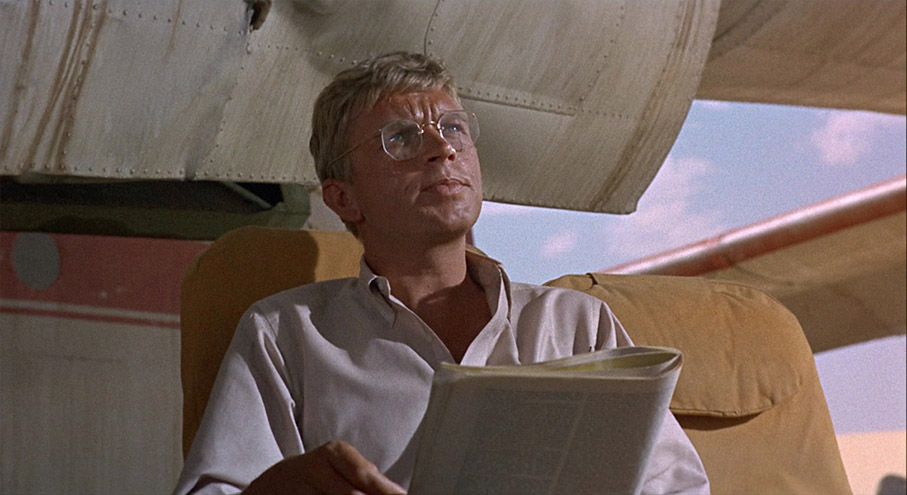
Absolutely plain to anyone who's worked with film is the quality shift when we see what must be stock footage of Arab raiders and their camels. The grain blows up from specks to golf balls. There are no scenes between our survivors and the locals, a facet that emphasizes the footage's 'otherness'. You accept it in situ with the far superior original stock of the main film but if you're sensitive to it, it will pull you up short. In the aftermath of a meeting with the indigenous raiders, there are startling views of death that may have been quite shocking for 1965. The blood on the sand is rendered almost black which manages to give it an even grislier effect. I was reminded of the censor demanding that Scorsese re-grade his bloody finale of Taxi Driver. The result was a level of realism even Scorsese was shocked to achieve. Way to go, censors...
Someone once taught me that there's only one thing more powerful than the threat and indeed the reality of death... Drum roll... And that is the compulsion 'to be right'. All of us are right most of the time. And if you disagree with me then you're probably right about that too. We call people who would rather die than be wrong 'martyrs' and the news is full of them blowing themselves up for some imaginary deity. The really smart scientists in the world prize humility very highly. Being proved wrong is part of a scientist's life and dogmatism is a poor badge of honour when 'facts' are always open to fluid interpretations. Jimmy Stewart makes a speech late in the film questioning if it really is his stubborn nature that stops him from falling in with Krüger's plan. How can this German possibly succeed when the expert flier knows how many things can go wrong? Being right almost scuppers the men's chances of survival but Stewart's character is smart enough to understand the machinations of his own mind, something not many of us are privy to. And so in metaphorical terms, The Flight of the Phoenix can be viewed as a baton pass from the rugged, physical, seat-of-your-pants strategies to the calculating rigidity of mathematics and physics. Or you can ignore the metaphor and just revel in the intense drama and try to maintain your nails as Stewart attempts to start the engine with only so many explosive capsules to kick-start the propeller... Absolutely, nerve-shreddingly brilliant.
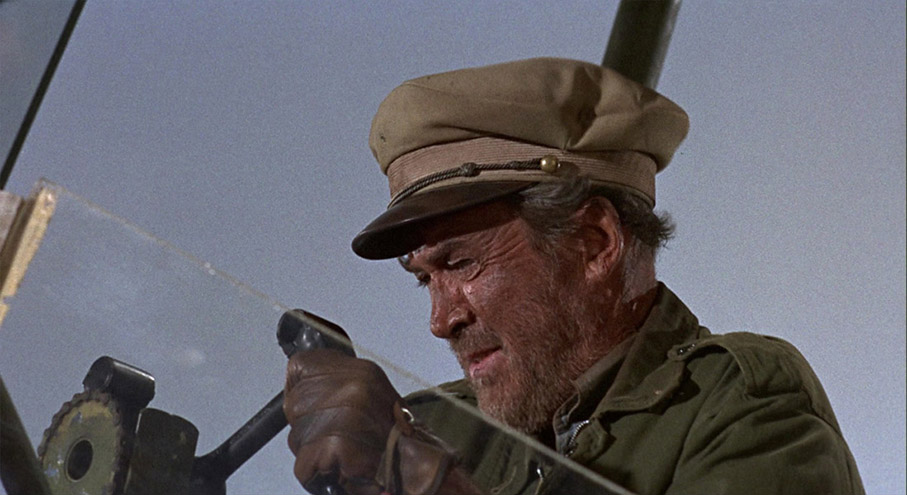
Postscript:
Yes, The Flight of the Phoenix was remade in 2004 (dropping the 'The') with almost identical dramatic beats to the original (what was the point of that?) but it is with some devilish glee that I mention that the remake is probably more famous now for providing a cramped backdrop to Hugh Laurie auditioning for some medical drama called House...
The 1.85:1 aspect ratio is maintained with small black lines at the top and bottom of screen, always a good sign. The movie looks terrific and you feel every bit of sunburn welt, see every wrinkle and bead of sweat on the characters' faces. Yes, there's grain but as I've said before, that's a good thing, a celluloid thing. There are very few blemishes at all. The process shots – what we now call 'green scene' scenes and used to be called blue screen – are limited by the sixties' tech and some outlines are visible around the characters in front of a background placed in later optically. While it's obvious the plane and actors are clearly on location, there are a few pick up 'exterior' shots that betray some studio work. I only noticed them because the location photography is so splendid.
The mono sound mix hasn't aged as well as the picture. Sync track backgrounds jump in harshly and the music cues are often too strident. There's no great distraction but if you listen to the sound on headphones, these issues become apparent. There are English subtitles for the deaf and hearing impaired.
Isolated music and effects track
Regular visitors to this site will no doubt be stunned into torpor by my constant, repetitious rants about this one 'extra' feature so skip to the next if I've bored you about this before. For newbies, a little movie post production snippet of information. The isolated music and effects track (or M&E) is a necessary deliverable for all movies which allows a foreign dub to take place with the English actors' voices replaced by their foreign counterparts. For entertainment's sake, there seems to be little value in its inclusion on a Blu-ray disc except for it upping the extras' count by one. Score aficionados (a title I hold with some pride) get no satisfaction because it is a pre-mixed track. If it was a music track on a discrete audio channel and the same for the effects, then we'd be cooking. As it is, someone please let me know what its entertainment value is (apart from having a laugh at seeing the actors lip flap with no sound coming out of their mouths).
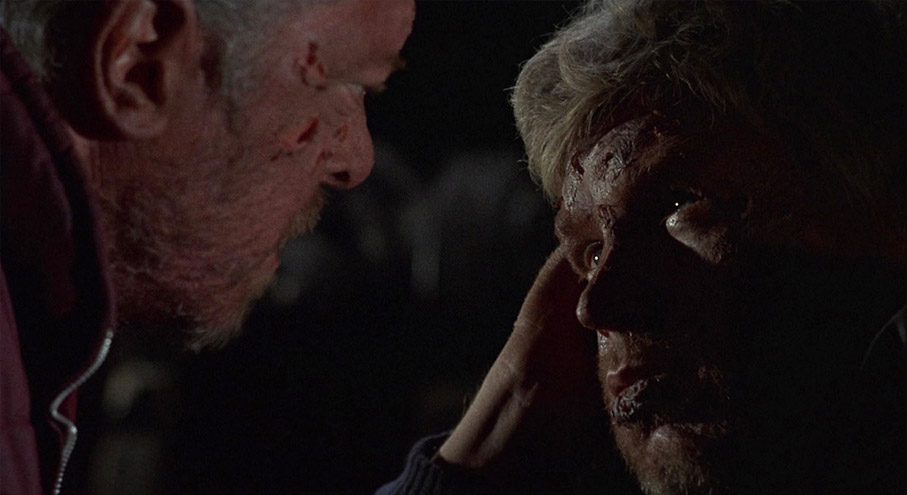
New video interview with film historian Sheldon Hall (25' 52")
A warning about spoilers reassuringly appears at the head of this talking head extra. Mr. Hall seems to have argued with a doorjamb. He's sporting an injured nose. Aside from that visual oddity, this is a solid extra in which Mr. Hall takes us through director Aldrich's career and specifically Phoenix. Posters, stills and mute clips from the movie illustrate his points. I was especially interested in his informing us about Aldrich's use of two cameras which allowed for more performance spontaneity. Nowadays, eleven cameras shooting the same scene simultaneously is not that unusual but in the days of film, it was a rare luxury.
Original theatrical trailer (3' 09")
This one's a beaut. "It is a most unusual motion picture where the excitement never runs out!" "One of the most ironic twists of fate you have ever experienced in a motion picture..." All the hyperbole is present in this 1080p trailer very far from any original negative. It's soft and a bit grubby but it's a fascinating example of its kind. "Sometimes a motion picture sets the screen on fire..." No argument from me. Great stuff.
A booklet featuring a new essay by film scholar Neil Sinyard and archival imagery
Sinyard delivers a solid essay on both Aldrich and the film though it’s best to see the film before reading it. He reveals the rug pull on page 14, something much more satisfying to encounter cold. He uses the quote I used in his appreciation of the sub textual elements in the film and sneaks a 'who' in the actual quote where there was no 'who'. God, am I really that pedantic? I also find it somewhat amusing (and desperate from the once active 20th Century Fox marketing department) to find the image of the belly dancer on page 2 and the back page with Aldrich directing. Yes, we all know sex sells but really? The photos are well selected and the essay is followed by Viewing Notes and Blu-ray Credits.
The Flight of the Phoenix is what Hollywood does best despite its initial failure at the box office. Now, a genuine cult classic, Robert Aldrich's movie is an adventure tale with genuine suspense, superbly well-rounded characters and action that never feels forced or unreal. Highly recommended.
* http://www.filmreference.com/Directors-A-Ba/Aldrich-Robert.html
|